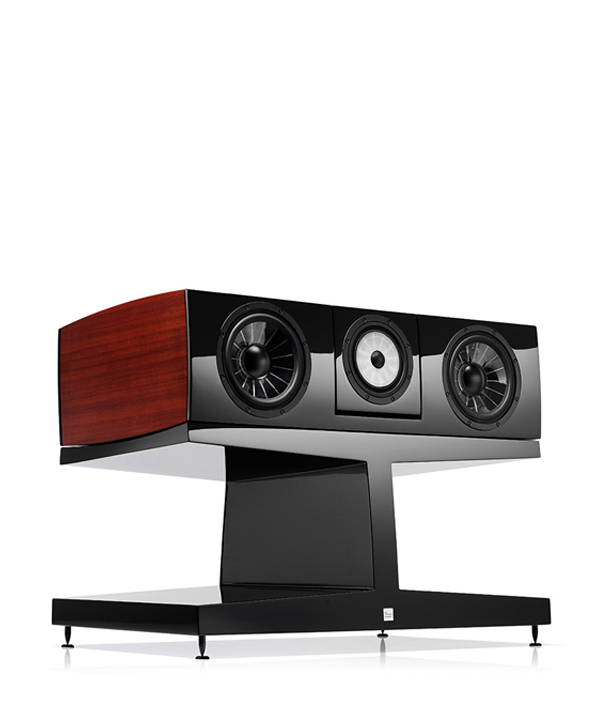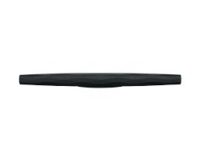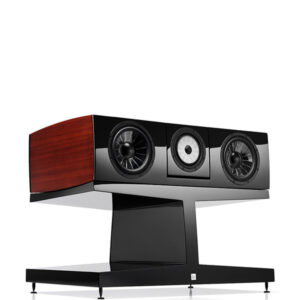Vienna Acoustics Poetry LCR Speaker
Description
In this new era where the promise of truly high resolution audio playback has finally become a reality in home theater, we have created Poetry. Named for one of the most famous “movements” within Gustav Klimt´s, Beethoven Freeze, Poetry aims to set a new standard. Capable of being used in a Left – Center – Right configuration or additionally as surround channels, Poetry possesses an ability to produce the proscribed full range frequency range without dynamic limitation. As a center channel only, it was designed to offer proper matching with our flagship model from The Klimt Series, The Music, without compromise. Created around the same patented Flat-Spider-Cone™ coincident driver system that offers vocal clarity and dispersion before not possible, there is the same hand crafted silk dome tweeter at its center. On either side of the sealed enclosure housing this driver system are our patented Spider-Cone™ woofers each individually vented via large rear mounted ports.
Specifications
System type
- 3-way system, employing integrated subwoofers
Frequency response
- 32Hz – 20kHz
Bass drivers
- 2 x 23cm Patented Vienna Acoustics Spider-Cone
Midrange – Tweeter Coincident
- 18cm Patented Vienna Acoustics Flat-Spider-Cone midrange with 2.5cm hand crafted neodymium center vented silk dome tweeter
Sensitivity
- 90db
Impedance
- 8 ohms
Recommended power
- 50 – 300 watts
Speaker Weight
- 50kg / 110lbs
Speaker Dimensions (WxHxD)
- 920mm/36.25” x 270mm/10.75” x 550mm/21.75”
Stand Weight
- 40kg / 90lbs
Stand Dimensions (WxHxD)
- 920mm/36.25” x 580mm/17.75” x 580mm/23” (including spikes)
Finishes
- Sapeli and Piano Black Lacquer
Why Would We Name a Speaker Line after a Painter?
It seemed only natural to name the absolute Reference Vienna Acoustics has ever created in homage to one of the most thrilling artists the city has ever unleashed – a man whose immense achievements in visual art were profoundly inspired by music.
Born just south of the capital in 1862, as a teenager Gustav Klimt studied architectural painting in Vienna before launching his early career as a painter of murals and ceilings. Before Klimt reached his thirtieth year, he had earned recognition from Austria’s emperor and a recommendation to join the faculty of Vienna’s prestigious Academy of Fine Arts. But such a conventional career was not to be for this passionate innovator.
“To the age its art, to art its freedom.”
Gustav Klimt started with the creation of the Beethoven Frieze for the Viennese Secession in 1897. The Secession was no dogmatic federation espousing artistic “rights” and “wrongs”; rather, this was a group of forward thinkers – with Klimt on top – exploring new departures in creation, urging artists of every persuasion – architecture, painting, music – to come together for the sake of progression. Just as important, the Secessionists were determined to bring that progression to the people, via publications and annual exhibitions.
Standing for the unconventional, for freedom from constraints of any kind, Klimt created a worldwide symbol for Jugendstil.
The Beethoven Frieze ranks among the major works of the Viennese Jugendstil and can only be comprehended in the context of this age and as a product of it – an age shaped by tendencies toward new departures in art, by an interest in international connections and by the attempt to bring the various arts together.
The Frieze belongs to the most significantcreations of Gustav Klimt, such as “The Kiss”, and the devoted music lover´s – and avowed Beethoven admirer´s – masterpiece “The Music”.
Art would never be experienced in quite the same way again.




